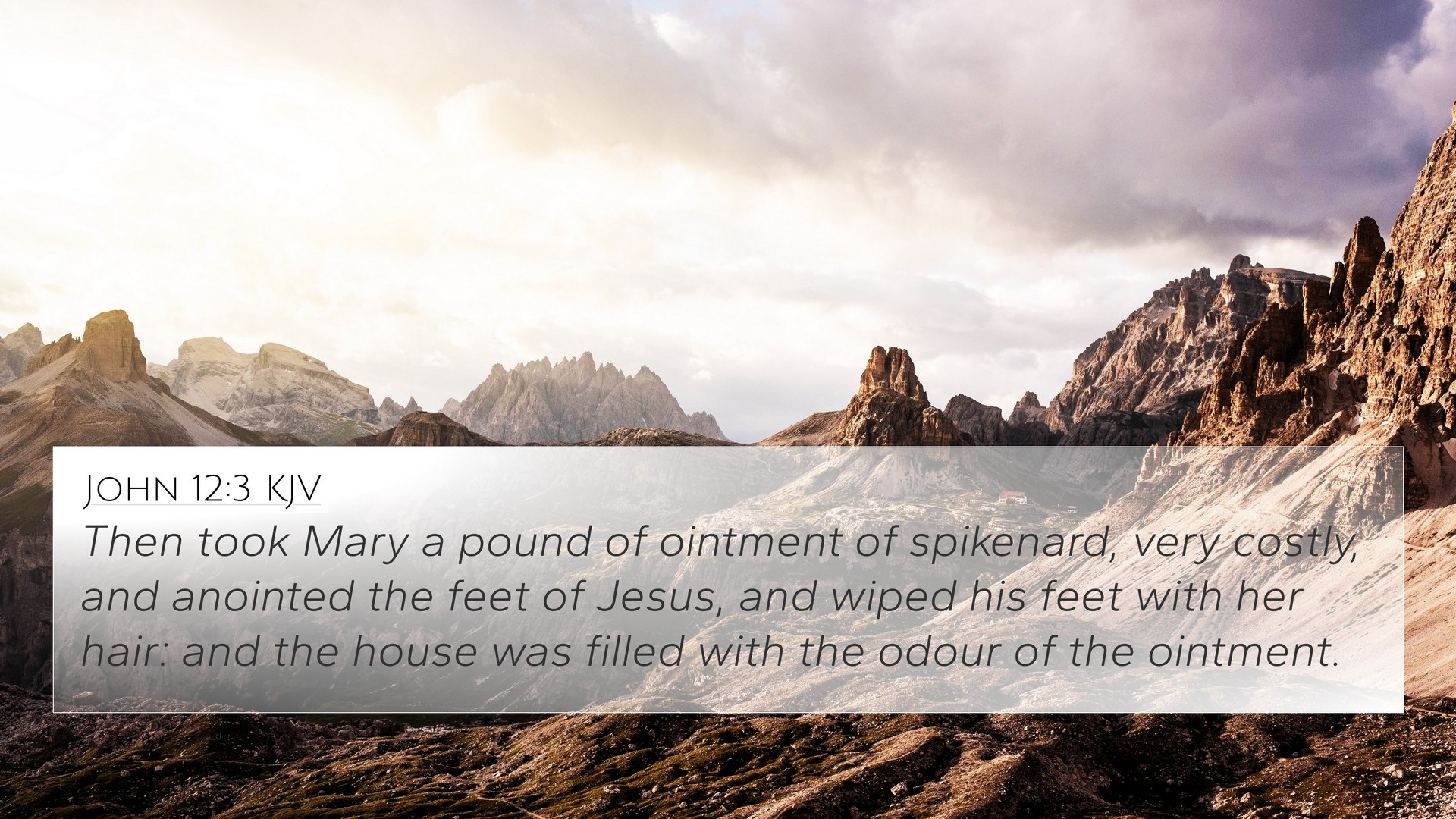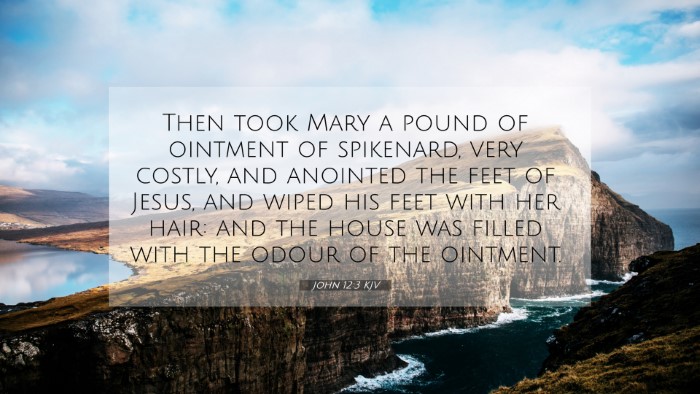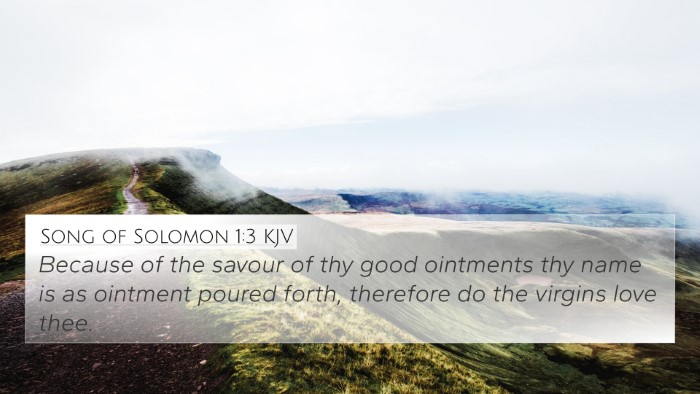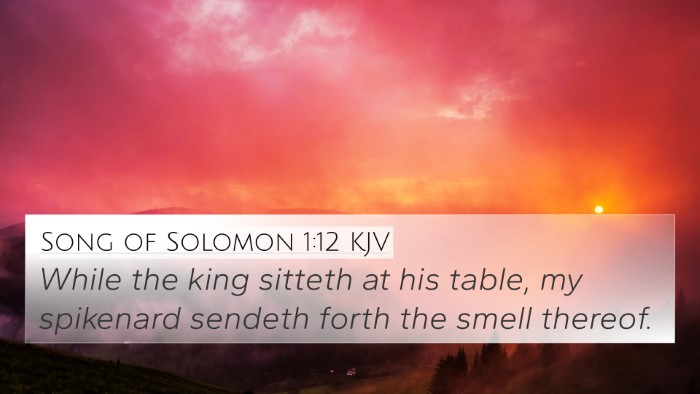Understanding John 12:3
John 12:3 states: "Then Mary took a pound of very costly oil of spikenard, anointed the feet of Jesus, and wiped His feet with her hair. And the house was filled with the fragrance of the oil." This verse captures a profound moment of worship and sacrifice by Mary of Bethany, highlighting themes of devotion and the recognition of Christ's worth.
Key Themes and Meanings
- Expressions of Love and Devotion:
This act of anointing shows Mary's deep love for Jesus. According to Matthew Henry's Commentary, she demonstrates her appreciation for Jesus's ministry and His impending sacrifice. Her actions are symbolic of heartfelt worship, illustrating how individuals can express their love for God through sacrificial acts.
- The Costliness of Worship:
Adam Clarke emphasizes that the spikenard was valuable, indicating that true worship often involves sacrifice. The act of using such precious oil highlights the idea that genuine devotion to God is often counterintuitive and costly.
- Foreshadowing Jesus' Death:
Albert Barnes notes that Mary’s anointing prefigures the burial of Jesus, as this act is a preparation for His upcoming death. This connection underscores the central theme of love intertwined with sacrifice in the narrative of the Gospel.
- Symbolism of Hair:
The use of her hair to wipe Jesus's feet carries deep symbolic meaning. It signifies humility and serves as a demonstration of submitting oneself fully to God, as noted by Clarke. Hair often represents glory and beauty, and Mary's act of using it reflects her willingness to show humility before her Lord.
- The Fragrance of Worship:
The entire house being filled with the fragrance of the oil serves as a metaphor for the impact of genuine worship. Henry reflects on this fragrance as a symbol of spreading the glory and grace of God in our lives, illustrating how acts of worship can influence those around us.
Bible Cross-References
John 12:3 is interconnected with several other scripture verses that provide a richer understanding of its context and significance:
- Matthew 26:6-13: This passage recounts a similar event where a woman anoints Jesus with precious ointment, reinforcing the theme of sacrificial worship.
- Mark 14:3-9: Mark’s account offers additional details about the woman's actions and the disciples' reactions, emphasizing the value of true devotion.
- Luke 7:37-38: The anointing of Jesus by a sinful woman illustrates another powerful act of love and repentance, deepening the understanding of worship.
- Philippians 4:18: Reference to offerings being a sweet-smelling aroma to God highlights the pleasing nature of sacrificial gifts to God.
- 2 Corinthians 2:14: Paul discusses the fragrance of the knowledge of Christ, linking back to the imagery of fragrance associated with worship.
- John 11:2: This refers to Mary as the same one who anointed Jesus, establishing consistency in the identity of the woman depicted across the accounts.
- Exodus 30:22-25: This Old Testament passage describes the construction of the holy anointing oil, drawing a parallel with the sacredness of the oil used in Mary’s act.
Connections Between Bible Verses
When considering the various connections between the verses mentioned, we can see that:
- Theme of Sacrifice: Both Mary’s anointing and the events in Matthew and Mark reflect the costly nature of true worship and its preparation for Jesus’s ultimate sacrifice.
- Women in Worship: The accounts in Luke and John highlight the significant yet often understated role of women in Jesus’s ministry.
- Fragrance as a Metaphor: The idea of fragrance connects John’s verse with the narratives in Corinthians and Philippians, extending the theme of spiritual offerings pleasing to God.
Further Insights
This verse and its surroundings encourage believers to explore their own expressions of devotion. As noted in various commentaries, understanding the historical and cultural context enhances the application of the scripture today. More so, we can draw parallels in our lives that reflect a similar commitment and love for Christ.
Practical Application
In practical terms, engaging with the themes of this passage can enhance one's personal worship experience. Consider the following:
- Evaluate Acts of Worship: Reflect on how you express your devotion to God. Are there ways you can elevate your worship or make it more sacrificial?
- Encourage Sacrificial Giving: Look for opportunities to give generously, not just financially but also of time and talent, as a reflection of your love for God.
- Engage in Community Worship: Participate in church activities that promote a culture of reverent worship and commitment to mission, echoing Mary's act in community.
Conclusion
John 12:3 serves as a powerful reminder of the nature of true devotion to Jesus. By combining insights from various biblical interpretations and commentaries, we see a multi-faceted understanding of worship that encompasses love, sacrifice, and the impact of our actions on ourselves and others.















